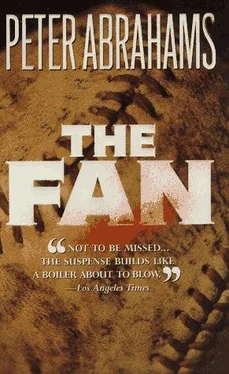Peter Abrahams - The Fan
Здесь есть возможность читать онлайн «Peter Abrahams - The Fan» весь текст электронной книги совершенно бесплатно (целиком полную версию без сокращений). В некоторых случаях можно слушать аудио, скачать через торрент в формате fb2 и присутствует краткое содержание. Жанр: Триллер, на английском языке. Описание произведения, (предисловие) а так же отзывы посетителей доступны на портале библиотеки ЛибКат.
- Название:The Fan
- Автор:
- Жанр:
- Год:неизвестен
- ISBN:нет данных
- Рейтинг книги:4 / 5. Голосов: 1
-
Избранное:Добавить в избранное
- Отзывы:
-
Ваша оценка:
- 80
- 1
- 2
- 3
- 4
- 5
The Fan: краткое содержание, описание и аннотация
Предлагаем к чтению аннотацию, описание, краткое содержание или предисловие (зависит от того, что написал сам автор книги «The Fan»). Если вы не нашли необходимую информацию о книге — напишите в комментариях, мы постараемся отыскать её.
The Fan — читать онлайн бесплатно полную книгу (весь текст) целиком
Ниже представлен текст книги, разбитый по страницам. Система сохранения места последней прочитанной страницы, позволяет с удобством читать онлайн бесплатно книгу «The Fan», без необходимости каждый раз заново искать на чём Вы остановились. Поставьте закладку, и сможете в любой момент перейти на страницу, на которой закончили чтение.
Интервал:
Закладка:
Pitch on the way. Fat and clear, but not the slider; back-spinning, but not the fastball: a change-up. An 0-and-2 change-up, so slow Bobby thought he could see the diagonal pattern of the stitches on the ball. He watched it all the way.
“Strike three.”
“Lucky son of a bitch,” said the catcher. He snapped a throw down to first, in case Lanz was napping.
A perfect afternoon for baseball. Bright sun, no wind, eighty degrees. Bobby struck out in the fourth, struck out in the seventh. Burrows substituted for everyone after that. Bobby walked to the end of the bench. “I’d like to stay in,” he said.
“Yeah?” said Burrows.
“Yeah.”
“Thought you got a little shook up making that catch. Outstanding.”
“I’m fine.”
“Okay.” Burrows rose and scratched the name of some rookie off the lineup card taped to the dugout wall and inked Bobby back in.
Bobby batted again in the bottom of the ninth, two out, no one on, thunderheads rolling in now, maybe a hundred people left in the stands, game meaningless. He heard the community-relations guy calling, “Come on, Bobby Rayburn.” He had one of those high, carrying voices that separated itself from the crowd noise.
“Shut the fuck up,” Bobby said.
“I didn’t say shit,” the catcher said.
Bobby struck out on three pitches. A cold raindrop landed on his nose as he went back to the dugout.
Bobby showered and changed. The community-relations guy approached his stall, talking on a cellular phone. He handed it to Bobby. “Call for you.”
“Yeah?” Bobby said.
“Mr. Rayburn?” said a woman. “I just want to thank you so much.”
“For what?”
“For trying.”
“Who’s this?” Bobby asked.
The woman spoke her name. It meant nothing to Bobby. “Sean’s mother,” she explained.
“Oh, yeah,” said Bobby. “Don’t worry. I’ll get hold of one for him, sooner or later.”
The woman made a strange sound, high-pitched, ragged. “He passed away, Mr. Rayburn. I’m sorry.”
“Passed away?”
“Right after the game. The doctor said by all rights he should have died last night. He just willed himself to stay alive. Because of you. Thank you for that extra day, Mr. Rayburn.” Her voice broke. The line went dead.
Bobby handed the phone back to the community-relations guy. “Screen my calls from now on,” he said.
Bobby took a taxi to a restaurant, remembering his new car only when he got there. The restaurant was dark inside, which suited him fine. Bobby sat by himself at a back table, watching the thunderheads through the window, waiting for the rain to fall. It never did. Just that one stupid drop. At sunset the sky cleared and then went dark. The moon came out. Bobby had a few beers, then a New York cut with salad and baked potato, then a few more beers. He called home on his way out. No answer.
Bobby took a cab back to Soxtown, stopping to buy a flashlight on the way. The complex was dark, Bobby’s car alone in the parking lot. Bobby walked all the way around, until he stood outside the center-field fence of the game field. He climbed over.
Beaming the flashlight a few feet ahead, Bobby moved back and forth across the grass in left center. After a while he got down on his hands and knees, combed the grass with his fingers. He found a divot, lifted by the impact of his diving catch, found the bared spot it had come from, even found a tiny plastic chip from the locket, buried in the skid mark. But he didn’t find the four-leaf clover.
Bobby drove back to the Flamingo Bay Motor Inn and Spa, let himself into his room, switched on the light. A woman was in his bed, sleeping on her stomach.
“Christ,” Bobby said.
The woman rolled over. “Disappointed?” she said. It was his wife.
“You said you were going to call.”
“I’m sure you meant that to sound more welcoming.”
Bobby saw she hadn’t been sleeping at all; she still wore lipstick, eye shadow, earrings. “Where’s Sean?” he asked.
“At my mother’s.”
“You should have brought him.”
Val looked at him in surprise.
His ribs hurt. And he’d stopped seeing the ball.
6
“ Edge geometry,” Gil’s father would say. “That’s what it’s all about.” He’d tap the steel with the tuning hammer, indicating the spot. Gil would strike with the twelve-pounder. Tap, strike, tap, strike: the steel cherry-red from the forge; the anvil live and quiet; Gil still a boy, but big and strong; his father the master.
They lived in the trailer. The forge was out back, in the barn. RENARD STEEL FORGE, read the sign over the door. Winters were best, when the coke in the forge glowed hot, and the wind whined and moaned through cracks in the old walls. In airless summers, nothing came through the wide-open door but black flies, and Gil’s sweat ran down his bare arms, down the twelve-pounder, sizzling on the steel with every stroke. He got stronger and stronger, became the finest striker his father had ever had. But by then it was an anachronism. Every smith who could afford one had a power hammer; and Gil never mastered edge geometry, or any of the other precision skills. He just liked to swing the big hammer.
Gil awoke from a forge dream in sheets damp with sweat. Edge geometry; precision skills: none of it mattered anyway. His father got sick, and soon after the moneymen came and took their name away. Gil’s eyes went to the picture of Richie; his father had been called Richie too. There was no resemblance. Gil turned on the radio.
“-may have reinjured those ribs making a sensational diving catch in the first inning. Certainly there was a lot of comment in the press box about Burrows leaving him in.”
“Why take chances with the big-ticket guys, Jewel, especially in the month of March?”
“That’s it exactly, Norm. And the thing is he didn’t look like himself up there at the plate yesterday. Sid Burrows may have a lot to answer for.”
“Thanks, Jewel. See you at the top of the hour. We’ll go to the phones after this brief-”
In a bad mood now, Gil put on his robe, picked up his toilet kit, and walked down the hall to the bathroom. Lenore had already been there. The mirror was steamed, except for a cleared circle in the center where his own face now appeared, sniffing. He smelled her perfume, a dense, rich smell of tropical flowers, a smell that gave him a headache, or made him aware of the headache he already had. Gil shaved, showered, went back to his room.
“-Ron in Brighton. What’ve you got for us, Ron?”
“Can we talk hockey for a sec?”
“Anything you want.”
Gil dressed: white shirt, blue suit, yellow tie. He had five or six yellow ties, left over from the days when they were in. This one, with a pattern of tiny mauve discs, was his lucky tie, worn the day he earned his highest single commission, $3,740, from a sporting-goods chain that went bankrupt not long after. Gil was knotting his lucky tie when someone knocked on his door.
“It’s open.”
Lenore walked in, wearing her kimono, the one that came halfway to her knees. Gil’s headache, confined until then in a narrow wedge behind his right eye, began to spread.
“Nice tie,” Lenore said.
“Thanks.”
“Guess what the temperature is.”
Gil glanced out his window, saw no clues in the brick wall.
“Fourteen degrees,” Lenore told him. “And they’re calling for snow.”
That wasn’t cold to Gil, and snow didn’t bother him.
“It’s my day off, thank God,” said Lenore. “I’m going to spend it in bed.” The kimono opened a little, revealing more of her leg. Lenore had well-shaped, muscular legs; she’d run track in high school, had trophies on the cracked bureau in her room to prove it. Now she sold jewelry in a mall off the ring road.
Читать дальшеИнтервал:
Закладка:
Похожие книги на «The Fan»
Представляем Вашему вниманию похожие книги на «The Fan» списком для выбора. Мы отобрали схожую по названию и смыслу литературу в надежде предоставить читателям больше вариантов отыскать новые, интересные, ещё непрочитанные произведения.
Обсуждение, отзывы о книге «The Fan» и просто собственные мнения читателей. Оставьте ваши комментарии, напишите, что Вы думаете о произведении, его смысле или главных героях. Укажите что конкретно понравилось, а что нет, и почему Вы так считаете.












